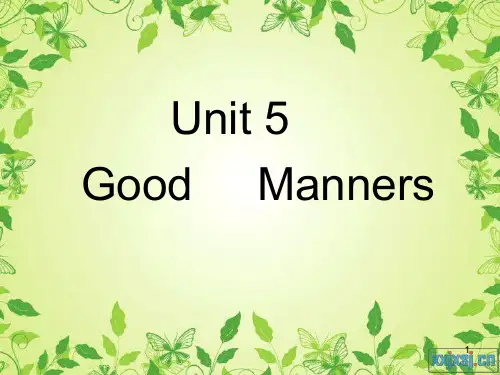中职英语拓展模块Unit 5
- 格式:ppt
- 大小:9.02 MB
- 文档页数:37

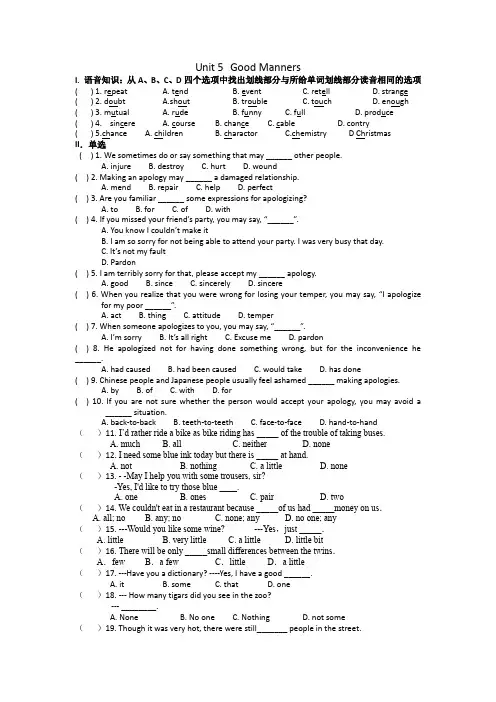
Unit 5 G ood MannersI. 语音知识:从A、B、C、D四个选项中找出划线部分与所给单词划线部分读音相同的选项( ) 1. repeat A. tend B. event C. retell D. strange ( ) 2. doubt A.shout B. trouble C. touch D. enough ( ) 3. mutual A. rude B. funny C. full D. produce ( ) 4. sincere A. course B. chance C. cable D. contry( ) 5.chance A. children B. charactor C.chemistry D ChristmasII.单选( ) 1. We sometimes do or say something that may ______ other people.A. injureB. destroyC. hurtD. wound( ) 2. Making an apology may ______ a damaged relationship.A. mendB. repairC. helpD. perfect( ) 3. Are you familiar ______ some expressions for apologizing?A. toB. forC. ofD. with( ) 4. If you missed your friend’s party, you may say, “______”.A. You know I couldn’t make itB. I am so sorry for not being able to attend your party. I was very busy that day.C. It’s not my faultD. Pardon( ) 5. I am terribly sorry for that, please accept my ______ apology.A. goodB. sinceC. sincerelyD. sincere( ) 6. When you realize that you were wrong for losing your temper, you may say, “I apologize for my poor ______”.A. actB. thingC. attitudeD. temper( ) 7. When someone apologizes to you, you may say, “______”.A. I’m sorryB. It’s all rightC. Excuse meD. pardon( ) 8. He apologized not for having done something wrong, but for the inconvenience he ______.A. had causedB. had been causedC. would takeD. has done( ) 9. Chinese people and Japanese people usually feel ashamed ______ making apologies.A. byB. ofC. withD. for( ) 10. If you are not sure whether the person would accept your apology, you may avoid a ______ situation.A. back-to-backB. teeth-to-teethC. face-to-faceD. hand-to-hand()11. I’d rather ride a bike as bike riding has _____ of the trouble of taking buses.A. muchB. allC. neitherD. none()12. I need some blue ink today but there is _____ at hand.A. notB. nothingC. a littleD. none()13. - -May I help you with some trousers, sir?-Yes, I'd like to try those blue ____.A. oneB. onesC. pairD. two()14. We couldn't eat in a restaurant because _____of us had _____money on us.A. all; noB. any; noC. none; anyD. no one; any()15. ---Would you like some wine? ---Yes,just _____.A. littleB. very littleC. a littleD. little bit()16. There will be only _____small differences between the twins.A.few B.a few C.little D.a little()17. ---Have you a dictionary? ----Yes, I have a good ______.A. itB. someC. thatD. one()18. --- How many tigars did you see in the zoo?--- ________.A. NoneB. No oneC. NothingD. not some()19. Though it was very hot, there were still_______ people in the street.A. littleB. a littleC. fewD. a few()20. Sorry, I can’t answer your question. I know_______about the news.A. noneB. littleC. fewD. neitherIV. 完形填空:There are two men in important positions in my office –Mr. Thompson and Mr. White. Everyone enjoys working with Mr. Thompson, ___1___no one likes Mr. White.Mr. Thompson is always thoughtful and considerate. When he wants something___2___, he’ll ask “Would you mind getting this information for me, please?” Mr. White is just the ___3___. He usually shouts ___4___the room, “Get me this memorandum, and hurry up.”Mr. White surprised us this morning, though. At first we thought he must be sick. He was ___5___ and agreeable. “Miss Erickson,” he asked, “if it isn’t too much ___6___ for you, could you please make these telephone calls for me?” June Erickson was astonished. Right after that, Mr. White said, “Miss Reed, would you be so kind ___7___ open the window? It’s quite warm in here.” Then he talked to me. “I’d appreciate it very much if you’d mail these letters for me.”We couldn’t imagine why he was behaving so___8___. Should we offer him aspirins? Or had Mr. White changed his personality?The situation was soon cleared up. “Ladies,” Mr. Thompson said, “I’ve been ___9___that the president of the company will be here soon. He’s very interested in the welfare of his employees and will have some __10___to ask you about your working conditions here.”( ) 1. A. but B. and C. or D. still( ) 2. A. do B. done C. to do D. doing( ) 3. A. same B. another C. opposite D. other( ) 4. A. with B. for C. at D. across( ) 5. A. kind B. hard C. rude D. terrible( ) 6. A. question B. trouble C. problems D. difficulty( ) 7. A. in order to B. that C. as to D. and( ) 8. A. happily B. wildly C. funny D. strangely( ) 9. A. told B. said C. telling D. asked( ) 10. A. things B. questions C. problems D. troublesV. 阅读理解:AWhen meeting people, the way you dress, move, shake hands, and look at others can sometimes be more important than what you say.You should do as follows.Stand up when you are introduced to another person. Standing shows that you are interested in meeting the other person. Look directly at the person you are meeting.Shake hands with a strong, firm handshake. If you have gloves on, take them off. Reach your right hand out. Grip (紧握)the other person’s hand firmly. Do not crush (过于用力), please! Shake just once and let go. Do not hold the person’s hand for long. If your hands are dirty or wet, do not shake hands. Say “Sorry, my hands are dirty.”In formal situation there are special rules for introducing two people. For people in different ranks, you should introduce the subordinate (下属)to the superior (上级)first. Among equals, outside of work, you should introduce the younger person to the older one, and the male to the female. In a business office, people may be introduced by first and last names. At some work sites, male workers might use their last names only. At a party, people are often introduced by first names.Do not use business cards in social introduction. If you later talk about business, you can ask for the other person’s business card. It’s OK to write notes to help you remember details of the meeting on the back of the card.Look at the person you are talking to. Use the person’s name when you talk t o him or her. Find out what the other person is good at or likes to talk about. Avoid personal questions. Don’t ask their age, how much they paid for something, or how much money they earn. Don’t interrupt when someone else is talking. On the other hand, d on’t talk too long.Don’t whisper to keep another person from hearing your conversation. Don’t brag (吹牛)about yourself.( ) 1. According to this passage, ______ sometimes is not so important as ______.A. the way you dress….what you sayB. the way you shake hands…the way you dressC. the way you look at others…the way you dress, move and shake handsD. what you say… the way you dress, move, shake hands and look at others( ) 2. Which of the following should you do when you are introduced to anotherperson?A. Stand up, look directly at the person, and shake hands with a strong, firm handshake for longB. Look directly at the person, stand up and crush the person’s hand with a strong hand for just onceC. Stand up, look directly at the person, and shake hands with a strong, firm handshake for just onceD. Stand up, do not look directly at the person, shake hands with a strong, firm handshake. ( ) 3. When you are going to introduce a new employee and the boss to each other, you should introduce ______ first.A. yourself to the bossB. the employee to the bossC. the employee to yourselfD. the boss to the employee( ) 4. When you talk to John Benson, you should call him ______.A. Mr. BensonB. Mr. JohnC. SirD. Mister( ) 5. When you have dinner with Jack, Mary and Tom, and you want to talk to Mary, it is polite that ______.A. you talk to Mary loud enough so that the others can hearB. you ask Mary to come out to talk with youC. you talk to Mary in a low voice so that the others can’t hearD. you whisper to MaryBEveryone needs friends. We all like to feel close to someone. It is nice to have a friend to talk to, laugh with, and do things with. Surely, there are times when we need to be alone. We don’t always want people around. But we would feel lonely if we never had a friend.No two people are just the same. Sometimes friends don’t get along well. That doesn’t mean that they no longer like each other. Most of the time they will make up and go on being friends.Sometimes friends move away. Then we feel very sad. We miss them very much. But we can call them and write to them. It could be that we would even see them again. And we can make new friends. It is surprising to find out how much we like new people when we get to know them.Families sometimes name their children after a close friend. Many places are named after men and women who have been friendly to people in a town. Some libraries are named this way. So are some schools. We think of these people when we go to these places.There’s more good news for people who have friends. They live longer than people who don’t. Why? It could be that they are happier. Being happier helps you stay well. Or it could be just knowing that someone cares. If someone cares about you, you take better care of yourself. ( )6. The first paragraph tells us _________A.making friends is the need in people’s lifeB.no one needs friendsC.we need to be aloneD.we always need friends around us( )7. Which of the following is what the writer doesn’t say in the passage?A.People are not happy when their friends leave them.B.People can know their friends in different ways.C.People need foreign friendsD.People like their friends very much if they get to know them.( )8. Which of the following is most probably the place people name after friendly people?A. A city.B. A room.C. A town.D. A library.( )9. People who have friends live longer than people who don’t because ________.A. they feel happier and healthyB. they get a lot of help from their friendsC. they take better care of themselvesD. both A and C( )10. The main idea of the passage is ________.A. that people are all friendsB. that people need friendsC. how to get to know friendsD. how to name a place。
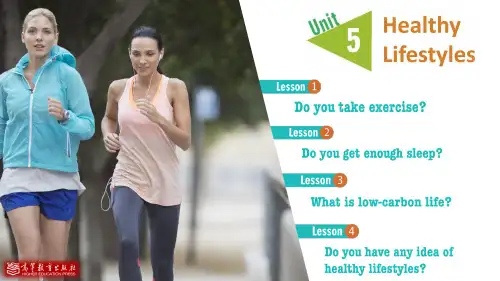
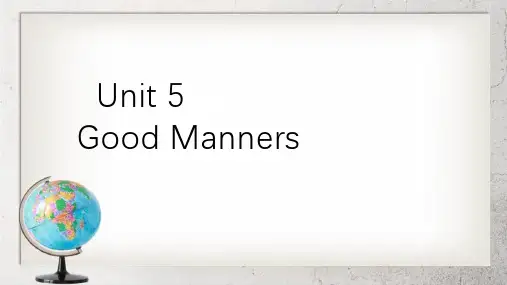
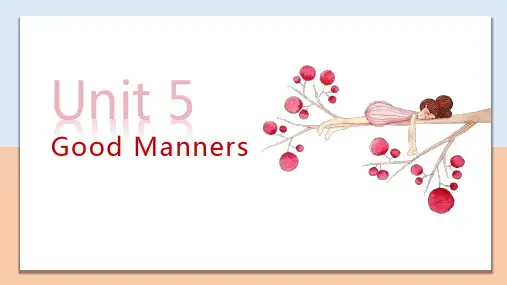
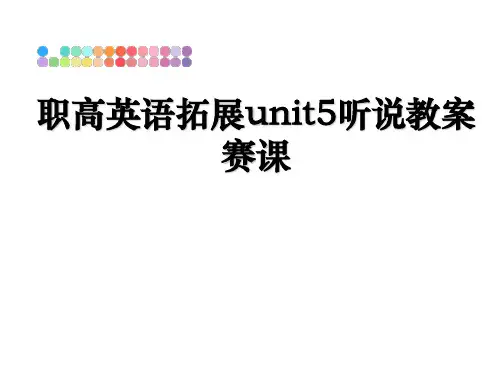
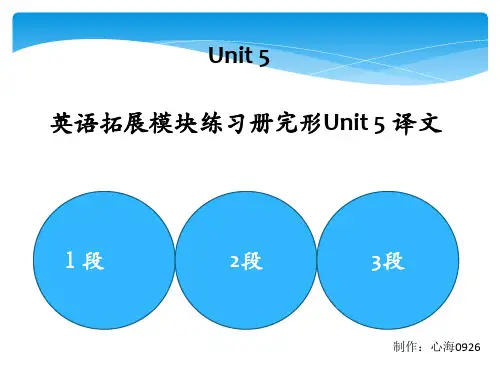
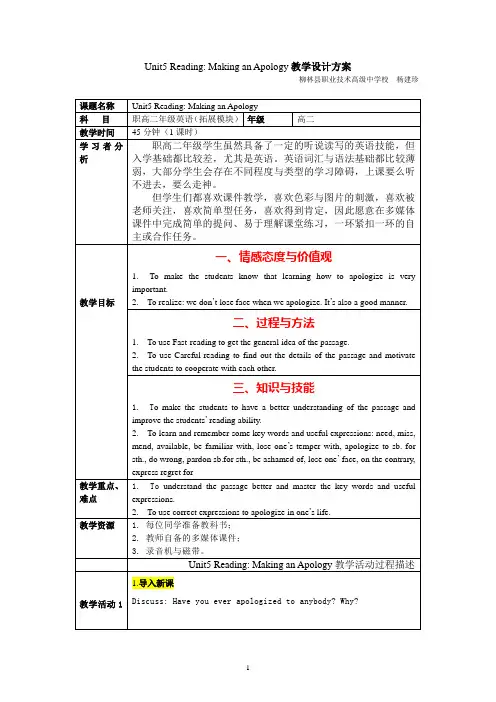
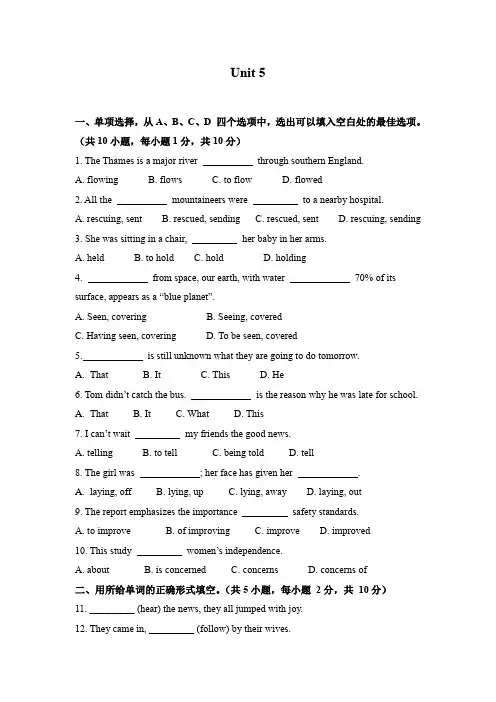
Unit 5一、单项选择,从A、B、C、D 四个选项中,选出可以填入空白处的最佳选项。
(共10小题,每小题1分,共10分)1. The Thames is a major river through southern England.A. flowingB. flowsC. to flowD. flowed2. All the mountaineers were to a nearby hospital.A. rescuing, sentB. rescued, sendingC. rescued, sentD. rescuing, sending3. She was sitting in a chair, her baby in her arms.A. heldB. to holdC. holdD. holding4. from space, our earth, with water 70% of its surface, appears as a “blue planet”.A. Seen, coveringB. Seeing, coveredC. Having seen, coveringD. To be seen, covered5. is still unknown what they are going to do tomorrow.A.ThatB. ItC. ThisD. He6. Tom didn’t catch the bus. is the reason why he was late for school.A.ThatB. ItC. WhatD. This7. I can’t wait my friends the good news.A. tellingB. to tellC. being toldD. tell8. The girl was ; her face has given her .ying, offB. lying, upC. lying, awayD. laying, out9. The report emphasizes the importance safety standards.A. to improveB. of improvingC. improveD. improved10. This study women’s independence.A. aboutB. is concernedC. concernsD. concerns of二、用所给单词的正确形式填空。
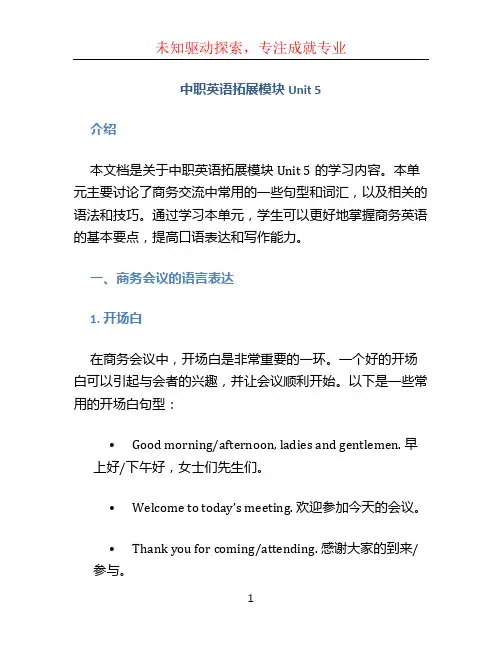
中职英语拓展模块Unit 5介绍本文档是关于中职英语拓展模块Unit 5的学习内容。
本单元主要讨论了商务交流中常用的一些句型和词汇,以及相关的语法和技巧。
通过学习本单元,学生可以更好地掌握商务英语的基本要点,提高口语表达和写作能力。
一、商务会议的语言表达1. 开场白在商务会议中,开场白是非常重要的一环。
一个好的开场白可以引起与会者的兴趣,并让会议顺利开始。
以下是一些常用的开场白句型:•Good morning/afternoon, ladies and gentlemen. 早上好/下午好,女士们先生们。
•Welcome to today’s meeting. 欢迎参加今天的会议。
•Thank you for coming/attending. 感谢大家的到来/参与。
•Let’s get started. 让我们开始吧。
2. 提出议程在商务会议中,需要明确会议的议程,以确保会议的目标达成。
以下是一些常用的提出议程的句型:•Let’s move on to the first item on the agenda. 让我们来进行第一项议程。
•The first item on the agenda is… 议程上的第一项是…•Our main focus today is… 今天的主要议题是…•We need to discuss… 我们需要讨论…3. 发表意见和建议在商务会议中,与会者需要积极参与讨论,并提出自己的意见和建议。
以下是一些常用的发表意见和建议的句型:•In my opinion, we should… 在我看来,我们应该…•I suggest that we… 我建议我们…•What if we… 如果我们…会怎么样?4. 辩论和达成共识在商务会议中,有时会有不同意见的辩论。
以下是一些常用的辩论和达成共识的句型:•I see your point, but… 我理解你的观点,但是…•I disagree. 我不同意。
